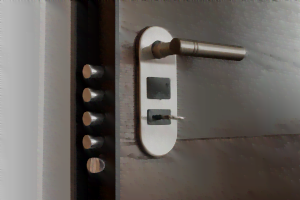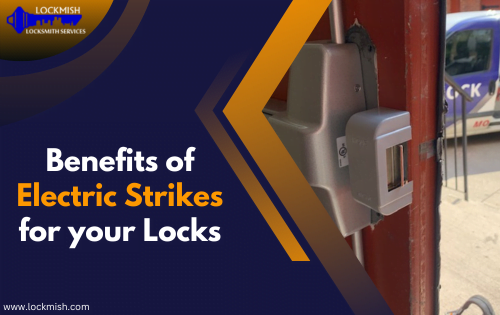Have you ever seen a home or a place of business that didn’t have a lock? Locks are on every building and are the first line of defence and offer security. But what lock should you opt for?
There are so many types of locks to choose from that it can be hard to pick what you need. They’re mostly categorized under electrical and mechanical locks. At Lockmish Locksmith Services, our locksmiths in Winnipeg have the expertise to handle both electrical and mechanical locks, but which one’s better?
It comes down to what your requirements are, but to pick the best, you need to know what the two are, how they work, and their pros and cons.
Electrical Locks
There are various types of locks within it, and they serve many needs, making them popular for residential and commercial buildings. Nearly all lock manufacturers now create electrical locks due to the high demand, and now most cars also come with electrical locks. But is the technology completely fail-safe, and are the things we’re trying to protect really safer with these locks?
The correct locking and unlocking pairing will make a significant difference in the final outcome. Around 33 million homes in North America (including Canada) have installed electrical locks. The locks are always improving, so let’s look at their working, types, and advantages.
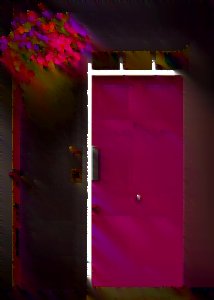
How Do They Work
This type of lock will work when an electric current is supplied. The current can be from a solenoid, electromagnet, or motor. It also comes with a choice of fail-safe or fail-secure. The fail-safe lock will automatically unlock when the power is cut off, whereas a fail-secure lock will stay closed.
Access control systems are also paired with electrical locks to enable the lock and unlock functions. Due to the high security of the locks, the market is expected to grow by a CAGR of 18.4% by 2027. Depending on the type of lock, it can be opened with a key fob, key card, or an access code. Regardless of the lock chosen, there must be an access method to provide the electronic impulse, or the door won’t open. They are also an important part of the smart home security system and have grown by 40% in use.
Types of Electrical Locks
Electrical locks are more sophisticated, and you will need a locksmith to install them correctly. Many types of locks are categorized as electrical, and you’ll need to understand them to know which one is right for your home or office.
1. Magnetic Locks
Magnetic locks have an armature plate attached to the door or an electromagnet attached to the door’s frame. The electromagnet attracts the plate when an electric current has passed and keeps the door securely locked. This type of lock isn’t recommended for front doors of homes or commercial buildings since they can be easily dismantled.
2. Electric Door Strikes
Electric strikes in Winnipeg are an improved and more secure version of the strike faceplate. They are mostly used to fortify a latch bar door. This multifunctional lock has several options depending on how the strike is installed. However, its effectiveness relies on what other lock it’s paired with.
3. Electronic Keypad Locks
Electronic keypad locks are well-known and common in use. They require a password, and as long as the code is kept secure, it will be extremely difficult for any outsider to bypass it.
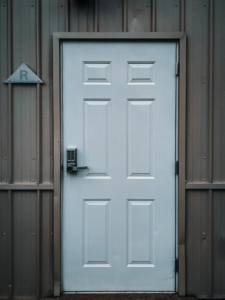
4. Electric Bolt Locks
Electric bolt locks are mostly used for cabinets or interior doors. They look similar to a deadbolt but are stronger. They can be added to other electrical lock systems and come with various fail-safe modes. The lock is easy to install but if you’re installing them on doors, hire a professional locksmith to ensure it’s done correctly.
5. Mortise Locks
Electric locks are available in mortise locks tied into an access control system. These locks have a wire that runs through the core and frame to the power supply and access control.
The wire provides the electric current, and the access control is used for locking and unlocking. They are also available in stand-alone locks with keypads or other credential readers. They run on an easily replaceable battery pack and are available in latch bolt monitoring and door position switch. They can be electrically locked (fail-safe) or electrically unlocked (fail-secure). Choosing between the two depends on the opening and the location.
6. RFID Locks
RFID lock has a radio frequency device that receives the signal to unlock a door. The RFID reader has a read range of 10 centimetres to 1 meter, making it one of the most versatile types of lock. A person doesn’t need to be close to the door to unlock it. This type of system is mostly used in high-security buildings and is integrated with lock systems. However, it’s easy to misplace the devices used to open such locks.
Pros of Electrical Locks
The demand for electrical locks is increasing yearly because of their many benefits:
- They provide fast access for locking and unlocking. For instance, an RFID lock can be opened directly through an app which will hardly take a second. Moreover, even with a keypad lock, it’s easier to enter combinations than to access a mechanical lock. These locks sometimes have a biometric option as well, making them even faster.
- Installation may require a locksmith, but changing the codes is easy to accomplish on your own. Setting or changing codes doesn’t require any tools.
- Most of the newer models are easy to service on your own. However, if you ever feel your lock is lagging or there may be some issue, call in a locksmithto verify.
- Some locks come with integrated lights to make them easier to operate at night.
- These types of lockshave a non-volatile memory that can retain a code combination if its battery runs out.
- There are safe locks behind the door; removing or damaging the keypad will not affect the overall security of the lock.
- The locks have a duress code that can either work with a code that sends an alert directly to the monitoring station or by arming/disarming buttons for three seconds that will sound an alarm.

Cons of Electrical Locks
As progressive as the technology is, there are still some ways it’s lagging behind:
- This type of lockneeds constant monitoring and battery changes.
- Since they have a more intricate mechanism than a mechanical lock, the cost is higher.
- Some people tend to panic when they forget their code and enter the wrong one multiple times
- If there’s a power outage, it may inhibit entry. However, most new models have ways to bypass it.
Mechanical Locks
Mechanical locks use a physical key to open, and electronic locks use an electronic keypad or card reader to open. Mechanical locks have been around for years, the farthest dating back to 6,000 years ago in Ancient Egypt. Modern locks are classified based on the security level, with some locks offering high security and others offering basic security. In addition, locks can be classified based on the type of mechanism they use to lock and unlock, like a deadbolt or a latch.
How Do They Work
Mechanical locks are a type of lock that uses a physical key to open. The key has teeth of a specific shape that correspond to the shape of the lock cylinder. When the key is inserted into the lock and turned, it manipulates the pins in the lock cylinder to align them with the shear line, allowing the lock to be opened. Some mechanical locks can also be opened using a combination, a sequence of numbers or letters used to unlock the lock. Mechanical locks are a common type of lock used in various applications, including residential, commercial, and industrial settings.
Types of Mechanical Locks
The types of locks that are categorized under mechanical locks include:
1. Deadbolt
Deadbolt locks are activated by keys or thumb turns and offer good security since they are durable. It also cannot be jimmied with a knife or credit card as commonly depicted in movies. There are several more types of deadlocks as well, such as single, single-cylinder, double, and c-deadbolt locks.
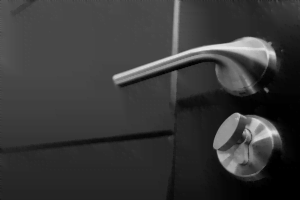
2. Mortise Lock
Mortise locks are a type of mechanical lock that is commonly used in commercial properties due to their strength and durability. A rectangular pocket or a “mortise,” is cut into the door and the lock body is installed within the pocket. Mortise locks typically have a deadbolt, a metal bolt that extends from the lock body into the door frame when the lock is locked. This makes it difficult to open the door without a key or other means of unlocking the lock.
They are typically more expensive than other locks, but they offer better security and are worth the investment for businesses that must protect their assets. In 2022, the market for mortise locks was valued at over USD 1771 million globally.
3. Cylinder Lock
A cylinder lock is a type of mechanical lock that uses a cylinder to control the locking and unlocking mechanism. It is a small, cylindrical component that is typically located within the lock body or handles. It contains a series of pins that must be aligned in a specific way in order for the lock to open. Cylinder locks are opened using a key. The shape of the key corresponds to the shape of the lock cylinder, and the key is able to manipulate the pins in the lock cylinder to align them with the shear line, allowing the lock to be opened.
Cylinder locks are commonly used on doors, sheds, garages, and padlocks. They are a popular choice for securing these types of objects because they are relatively simple to install and offer good security. However, they can be vulnerable to certain types of tampering, such as picking or drilling, so you should always pick a high-quality cylinder lock.
Pros of Mechanical Locks
Mechanical locks are still around for many reasons. Here are some:
- They have been the standard locks for centuries, so they’ve been tested by experts over a long time.
- Since they are easier and more cost-effective to produce, they are more affordable than electrical locks.
- They don’t have any batteries, which means they don’t require constant checks and monitoring for timely replacements.
- Even without consistent service, they last a long time and are stable.
- Electrical locks may develop problems if exposed to extreme weather conditions. Mechanical locks, on the other hand, are weatherproof.
Cons of Mechanical Locks
There may be benefits to mechanical locks, but there is a reason that electrical locks are becoming increasingly popular:
- They’re not as sophisticated as electrical locks. While there are many ways electrical locks have additional security layers, the same can’t be said for mechanical locks.
- Mechanical locks do not log in when the door is opened or closed.
- Rekeying lockscan only be done with a professional’s help.
- Keys are small and can easily be stolen. If you lose your keys with mechanical locks, you will need to call a locksmith to help you.
24-Hour Locksmiths in Winnipeg
Whether you have electrical or mechanical locks, if you have any trouble with them, you’re going to need to call a locksmith. A professional locksmith will install them, rekey them, and fix any problem they may have. Lockmish Locksmith Services is a 24-hour locksmith service for residential and commercial buildings along with automotive vehicles.
Our services include handling things like rekeying house locks, electric strikes, key duplication, and Wi-Fi keypad deadbolt fitting, car key programming in Winnipeg. Having trouble with your mechanical or electrical lock?
Give us a call at any time, and we’ll come right away!



